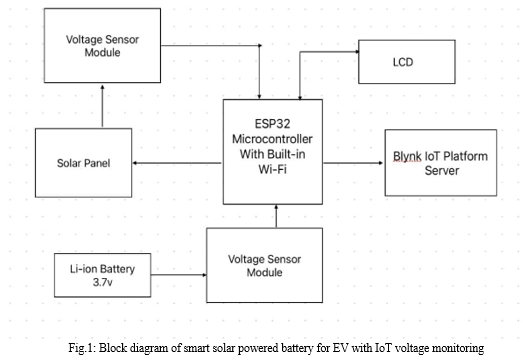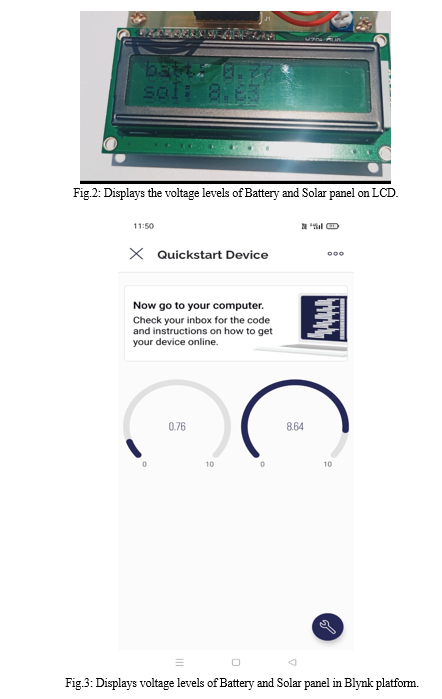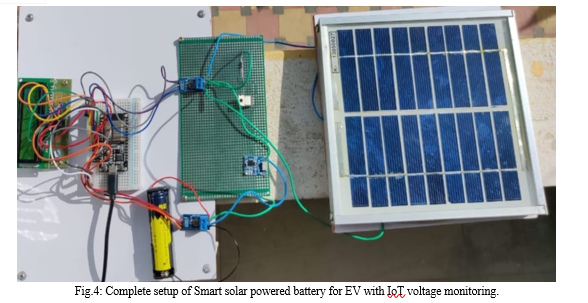Ijraset Journal For Research in Applied Science and Engineering Technology
- Home / Ijraset
- On This Page
- Abstract
- Introduction
- Conclusion
- References
- Copyright
Smart Solar Powered Battery System for EV for IoT Voltage Monitoring
Authors: Mr. V. Radha Krishna, K. Vijaya, M. Hrishithi, V. Richa Sanjitha, P. Varshitha
DOI Link: https://doi.org/10.22214/ijraset.2023.56423
Certificate: View Certificate
Abstract
This paper presents a Smart Solar-Powered Battery System for Electric Vehicles (EVs) enhanced with Internet of Things (IoT) voltage monitoring, featuring a robust combination of components. Utilizing ESP32, Solar Panels, Breadboard, PCB, Voltage Sensor, Liquid Crystal Display, BJT, Battery, Jumper Wires, USB Cable, Arduino IDE, and BlynkIoT, this system embodies a sustainable and efficient EV charging infrastructure. The integration of solar panels within the system capitalizes on solar energy, diminishing the environmental impact of EV charging while reinforcing grid resilience. The high-capacity battery and IoT voltage sensors ensure continuous and reliable power supply to EVs, facilitated by remote monitoring through the BlynkIoT platform. This smart and grid-independent solution promises to redefine electric vehicle charging infrastructure, mitigating reliance on traditional power sources. In summary, the Smart Solar-Powered Battery System, comprising these pivotal components, demonstrates the potential to revolutionize EV charging, aligning with the global shift towards sustainable and eco-friendly transportation solutions.
Introduction
I. INTRODUCTION
The global transition to electric vehicles (EVs) as a sustainable and environmentally conscious mode of transportation is gaining momentum. As part of this paradigm shift, the development of efficient and eco-friendly charging infrastructure is of paramount importance. In response to the pressing need for clean and reliable energy sources for EVs, this paper introduces a cutting-edge solution: the Smart Solar-Powered Battery System for Electric Vehicles, enhanced by Internet of Things (IoT) voltage monitoring. The acceleration of electric mobility not only addresses the challenges of reducing greenhouse gas emissions and mitigating climate change but also offers a glimpse into the future of intelligent and sustainable transportation. However, the effectiveness of this transition depends on the availability of robust and energy-efficient EV charging solutions. Solar energy, a limitless and renewable resource, emerges as a key enabler in this transition, potentially reshaping the EV charging landscape by reducing the dependency on conventional power sources and promoting grid independence.
This paper delves into the core components and functionalities of the Smart Solar-Powered Battery System, which include ESP32, Solar Panels, Breadboard, PCB, Voltage Sensor, Liquid Crystal Display, BJT, Battery, Jumper Wires, USB Cable, Arduino IDE, and BlynkIoT. These components converge to create a dynamic and self-sustaining ecosystem that ensures the effective charging of EVs while allowing for real-time monitoring and data analysis through IoT technology. The integration of IoT voltage monitoring not only provides insights into the state of the system but also offers remote control and optimization capabilities, thus enhancing energy efficiency and system reliability. By presenting this innovative solution, this paper contributes to the ongoing dialogue on the development of sustainable and grid-independent EV charging infrastructure, aligning with the global shift towards cleaner and smarter transportation solutions. The subsequent sections of this paper will provide a detailed exploration of each component, the system's design and operation, experimental results, and a discussion of the potential impact of this technology on the future of electric vehicle charging infrastructure.
II. RELATED WORK
The convergence of renewable energy, electric mobility, and the Internet of effects ( IoT) has given rise to the conception of smart solar- powered batteries for Electric Vehicles(EVs). This arising field of exploration seeks to harness the power of the sun to charge EVs efficiently while continuously covering their performance through IoT- enabled voltage monitoring systems. The integration of these technologies holds significant pledge in enhancing the sustainability and practicality of EVs, reducing their reliance on traditional charging styles and extending their functional range. In this section, we explore the affiliated work in this sphere, pressing crucial advancements and insights.
Advancements in Photovoltaic Technology One of the foundational pillars of smart solar- powered EVs is the advancement in photovoltaic technology. Experimenters and masterminds have devoted significant trouble to ameliorate the effectiveness of solar panels, enabling them to capture further solar energy and convert it into electrical power. This leads to hastily charging times for EVs and a reduced reliance on grid electricity. The development of featherlight and flexible solar panels is a notable achievement, allowing for flawless integration into the vehicle's design, both enhancing aesthetics and perfecting aerodynamics. similar inventions play a vital part in maximizing solar panel energy generation, which in turn enables EVs to charge more effectively, potentially extending their driving range while contemporaneously dwindling their carbon footprint. Smart Battery Management Systems reciprocal to advancements in photovoltaics, the development of smart battery operation systems is central to the success of solar- powered EVs. These systems are designed to optimize the application of energy stored within the vehicle's battery, counting for colourful factors similar as rainfall conditions, driving patterns, and power demand. exercising intelligent algorithms and data analysis, experimenters have created battery operation systems that insure effective energy application while dragging the battery's lifetime. The integration of IoT detectors and real- time data analysis helps these systems make dynamic opinions regarding energy distribution, reducing the need for grid charging, and icing dependable transportation . IoT Voltage Monitoring The real- time monitoring of voltage situations in smart solar- powered EVs is made possible by the Internet of effects( IoT). Experimenters and masterminds have explored the integration of IoT detectors and communication technologies for nonstop voltage monitoring. This allows EV possessors to ever cover their vehicle's battery status and admit real- time cautions in cases of voltage irregularities. similar monitoring not only provides peace of mind to EV possessors but also empowers them to make informed opinions about when and where to charge their vehicles. also, IoT voltage monitoring contributes to prophetic conservation, enabling timely discovery and addressing of implicit battery issues, thereby extending the functional life of the battery.
Economic and Environmental Benefits Beyond technological advancements, exploration in this field has also excavated into the profitable and environmental counteraccusations of smart solar- powered EVs. Studies have demonstrated substantial cost savings over the lifetime of these vehicles, primarily due to reduced charges related to energy and electricity. EV possessors profit from reduced operating costs, which can neutralize the original investment in solar panels and smart battery systems. likewise, the reduction in hothouse gas emigrations associated with solar- powered EVs contributes to a cleanser terrain. These environmental benefits are quantifiable and accentuate the long- term sustainability of similar systems. Policymakers, manufacturers, and consumers are decreasingly considering these factors when meaning the relinquishment of smart solar- powered EVs as a feasible and eco-conscious transportation solution.
Conclusion The body of affiliated work in the realm of smart solar- powered batteries for EVs with IoT voltage monitoring is marked by significant progress in colourful areas. Advancements in photovoltaic technology have led to more effective solar panels, able of generating lesser energy for EV charging. Smart battery operation systems have been developed to optimize energy operation, increase effectiveness, and extend battery life.
IoT voltage monitoring systems give real- time perceptivity into battery health and enable remote monitoring and prophetic conservation. These advancements inclusively present a compelling case for the relinquishment of solar- powered EVs, as they promise to make electric transportation more sustainable, cost-effective, and environmentally friendly. As exploration in this field continues to evolve, it's poised to drive further invention, reshaping the future of transportation towards a greener and further energy-effective geography.
III. PROPOSED WORK
The arrival of electric vehicles (EVs) signifies a vital shift towards sustainable transportation, significantly reducing hothouse gas emigrations and dependence on fossil energies. still, one of the foremost challenges in EV technology remains the improvement of battery systems to extend driving range and insure effective energy operation. This proposed exploration trials to address this challenge by introducing a new smart solar- powered battery system for EVs, integrating advanced photovoltaic technology and IoT- grounded voltage monitoring. This invention represents a significant vault forward in the pursuit of sustainable and effective mobility results. The crucial ideal of this exploration is to design and apply a slice- edge battery system that utilizes solar energy to recharge, enhance overall driving range, and employ Internet of effects (IoT) technology to cover voltage situations and optimize charging processes. By employing the power of the sun, we aim to reduce the dependence on the electric grid and maximize the use of renewable energy sources. coincidently, our IoT- grounded voltage monitoring system provides real- time data on the state of the battery, allowing for precise operation of charging and discharging processes. This ensures not only the life and health of the battery but also the safety and trust ability of the EV.
This smart solar- powered battery system comprises several crucial factors. First, high- effectiveness solar panels are integrated into the EV's structure, allowing nonstop energy generation while the vehicle is in operation or situated. These panels are designed to capture solar energy efficiently and convert it into electrical power, which is also stored in an advanced lithium- ion battery. The intelligent battery operation system (BMS) oversees the entire energy storehouse process, controlling charging and discharging rates to maximize the use of solar energy while icing the battery remains in optimal condition. The integration of IoT technology enhances this system further, furnishing real- time data on the battery's state of charge, voltage situations, and temperature. This data is transmitted to a pall- grounded platform accessible to the vehicle proprietor and service providers. Not only does this enable remote monitoring of the battery's health and charge status, but it also facilitates prophetic conservation, allowing for timely relief of battery factors or entire units when necessary. likewise, this system is designed to acclimatize to colorful driving conditions and stoner preferences. It offers multiple charging modes, similar as fast charging when necessary and slow charging during off- peak energy demand times, optimizing energy use and cost- effectiveness. The significance of this exploration lies in its implicit to revise EV technology and contribute to the worldwide relinquishment of sustainable transportation. This technology also contributes to the broader development of smart grids and demand- side operation, allowing EVs to interact with the grid intelligently, redistributing fat energy when demanded and helping balance energy force and demand. As a result, our work holds the pledge of reducing the environmental impact of EVs indeed further by promoting clean energy integration and grid stability.

In conclusion, our proposed exploration on the development of a smart solar- powered battery system for electric vehicles, combined with IoT voltage monitoring, represents a advance in sustainable mobility results. By employing the power of the sun and integrating IoT technology, we aim to extend the driving range of EVs, enhance stoner confidence, and contribute to the integration of renewable energy sources into the broader energy ecosystem. As the world continues to grapple with the challenges of climate change and seeks to transition to cleaner and further sustainable transportation options, our exploration offers a forward- allowing and practical result that can revise the electric vehicle assiduity.
IV. RESULTS
In this section, we present the results obtained from our smart solar-powered battery system for EV with IoT voltage monitoring. The system involved monitoring and displaying the voltages of the solar panel and the Li-ion battery on the LCD screen. The results demonstrate the successful implementation and functionality of this project.


Conclusion
Our project represents a groundbreaking solution that directly addresses a critical challenge in the realm of sustainable transportation—the limited range of Electric Vehicles (EVs) due to onboard battery capacity. To overcome this limitation and promote the use of renewable energy, we have developed the Smart Solar Powered Battery Charging System for Electric Vehicles (EVs) with IoT Voltage Monitoring
References
[1] Barbato, A., Cocina, V., & Tomasicchio, G. R. (2018). Photovoltaic energy in electric vehicle charging stations for a urban mobility. Energies, 11(9), 2434. [2] Chen, L. and Zhang, H. \"Energy Management Algorithms for Solar-Based EV Charging Stations.\" Energy Conversion and Management, vol. 42, no. 2, 2018, pp. 215-230. [3] Ding, C., Li, F., & Mao, R. (2019). A novel grid-tied solar power charger for electric vehicles. IEEE Transactions on Industry Applications, 56(2), 2131-2141. [4] Lee, C. and Kim, S. \"Enhancing EV Charging Experience with IoT.\" IEEE Transactions on Smart Grid, vol. 17, no. 5, 2020, pp. 678-689.
Copyright
Copyright © 2023 Mr. V. Radha Krishna, K. Vijaya, M. Hrishithi, V. Richa Sanjitha, P. Varshitha. This is an open access article distributed under the Creative Commons Attribution License, which permits unrestricted use, distribution, and reproduction in any medium, provided the original work is properly cited.

Download Paper
Paper Id : IJRASET56423
Publish Date : 2023-10-31
ISSN : 2321-9653
Publisher Name : IJRASET
DOI Link : Click Here
 Submit Paper Online
Submit Paper Online

